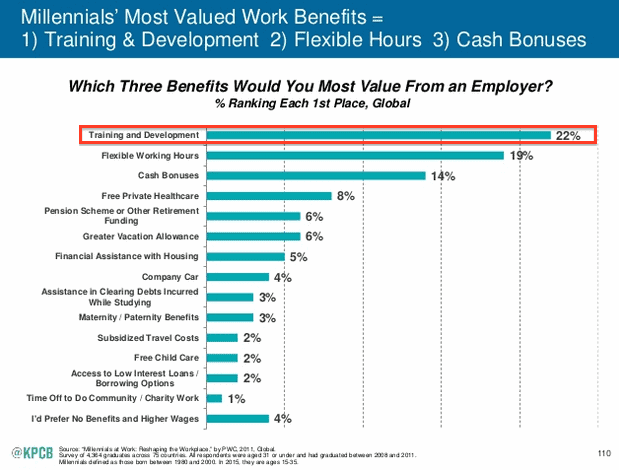"Who has time for this?!?”
"My team is doing fine.”
"I have too many reports to meet with everyone.”
"We're all adults here. We can handle our own problems.”
"One on one meetings don't scale and we only do scalable things here.”
There are a lot of excuses why you might not be doing 1 on 1s with employees on your team. And while they may seem like good reasons, there are a lot more reasons why you should be doing them.
If you're a hold out or skeptic of 1 on 1s, or trying to convince someone to do one on ones with employees on their team, here's a set of reasons they're an essential tool in a great manager's arsenal.

21 Reasons You Should Have One on Ones with Employees on Your Team
What convinces one person may have no effect on another person. That's why we've pulled together all the reasons we've seen work to get managers bought into having one on ones with employees.
And even if you are a fan and committed to one on ones, you may learn a thing or two you should be adding to your meetings.
Table of Contents:
- Follow veteran leaders who swear by them
- Give timely feedback and constructive criticism
- Get private feedback
- Float your ideas before they're fully baked
- Make time to talk about their career consistently
- Fix problems when they're small
- Show you care
- Coach & develop your people
- Learn empathy for them
- Get forgiven for your mistakes
- Make them feel heard
- Avoid surprise departures
- Learn what drives your team
- Create a safe space for their ideas
- Give them control of a meeting for once
- Relieve boredom or stagnation on your team
- Break up your day
- Have an excuse to get outside the office
- Have the conversations you never get around to
- Be more consistent with your team
- Improve your remote management
- Better lead through a crisis
- There's overwhelming data that shows 1 on 1s provide real value
- Have a happy, motivated team
- Get it right the second time

1) Follow veteran leaders who swear by them.
Ben Horowitz, VC at A16Z and former CEO of Opsware (acquired by HP for $1.6Bn), considered it a fireable offense for any manager that did not hold regular 1 on 1s. Andy Grove, founder & CEO of Intel and legendary leadership author also advocates for them. And dozens of other leaders, investors, and executives today like David Cancel, CEO of Drift, swear by them, too.

2) Give timely feedback and constructive criticism.
Are you doing annual reviews? Even if you've accelerated them to quarterly, it's still not timely enough to discuss performance improvement.
Think you can give feedback ad hoc? Doubtful.
When was the last time you really made time to give that feedback?
Chances are you thought of it, then got distracted by 37 other things and didn't want to schedule a meeting just for that. The great thing about 1 on 1s is that this can be just a small part of the meeting that's all about the team member. It flows more easily and doesn't freak out your team member like a "quick meeting to go over some recent feedback."
Need to get better about giving feedback?
- Learn 5 ways to give feedback better than the sh*t sandwich
- Get a step by step process to turn around an underperformer here.
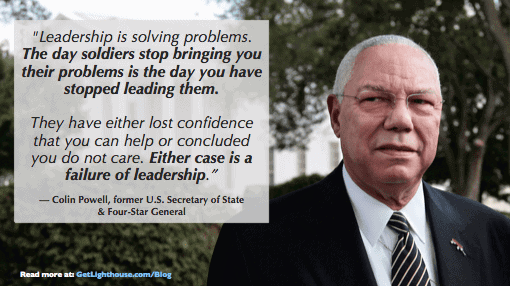
3) Get private feedback.
It's often hard to get feedback as a manager even though you know there are places you could improve. Not everyone wants to write out feedback on forms, and without encouragement and recognition, employees often give little detail on surveys.
Meanwhile, in 1 on 1s, assuming you've built rapport and trust, you have the perfect channel for the candid feedback that will help you improve, too.
Need help getting feedback from your team?
- Learn how to get more feedback from your team here.
- Try asking some of these awesome one on one meeting questions great managers ask their teams.

4) Float your ideas before they're fully baked.
Thinking about a new initiative and want unfiltered feedback before you invest a lot of time in it? A 1 on 1 is the perfect place for your semi-baked ideas you think may have an impact.
One of the best ways to improve your ability to inspire and lead your team is to focus more on getting buy in and support from them on new ideas and initiatives. The privacy and 1 to 1 nature makes it easier for them to voice their opinion and ask questions than a group meeting; it also avoids group think since you'll get the candid opinions from everyone without biasing them with their teammate's reactions.
Want to ensure you get great buy in from your team for your next project?
- Learn how to get buy in step by step and how to approach buy in when it's a major change for your team here.
- Want to ensure your team is on your side for the next change you make? Make sure you have a first follower, which you can learn about here.
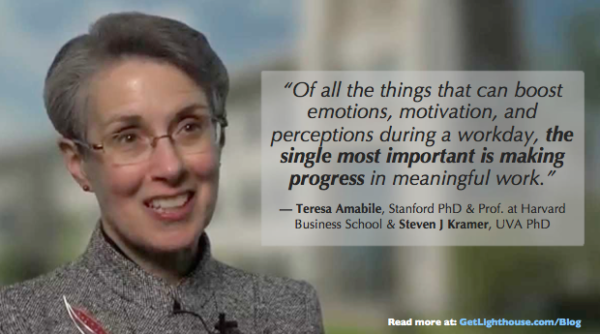
5) Make time to talk about their career consistently.
Everyone has career aspirations. They will want to grow and try new things. If you don't have the conversations with your people about this growth, they'll look for growth opportunities outside your company.
Without one on ones, these conversations often get lost in the shuffle and only surface during annual reviews which are quickly forgotten and never acted on. That's why data shows people tend to leave on and around their work anniversaries, since that is often a moment of reflection on their careers.
You can avoid all of this by making regular time to talk to them about their career goals, and lay out a plan for how they can get there. That feeling of progress will then help retain them and make them happier at work.
Learn more about helping your team grow:
- Here's how to help your team achieve their goals, including questions you can ask them to start the discussion.
- Learn how to help your team grow even when you can't promote them here.

6) Fix problems when they're small.
Are you constantly fighting fires and dealing with issues once they've exploded? Then you need 1 on 1s.
These meetings will help you catch these issues early on, whether between two coworkers or a problem discovered in a process in your company. You still have to follow through on what you hear, but knowing about the problem when it's small makes it much easier to address than when you have to triage later.
Unfortunately, your team is unlikely to tell you on their own. Instead, you have to create space, time, and ask questions to uncover it, and that's where one on ones with employees come in to create those opportunities.
Need to get better about fixing problems earlier?
- Learn how to get out of reactive management mode fighting fires here.
- Work to better manage your time by learning why priority management trumps time management.

7) Show you care.
You're making a major statement to your team when you set aside time for them regularly to talk about them.
Do not underestimate the impact that showing you care and that they're important will have on morale, commitment, and trust in you as a leader.
This is especially true when you take the time to build some rapport and trust with them. Find out what interests them, learn a bit about their family, and what drives them. As former Rent the Runway CTO, Camille Fournier, says it may surprise you how much they appreciate it.
Learn more about building trust and showing you care:
- Learn how to build rapport with anyone and why leaders across tech, military, and more prioritize building rapport.
- Find out how psychological safety can help you have a better, more creative team here.
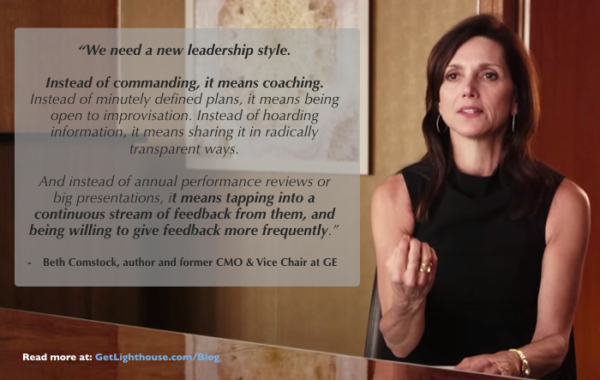
8) Coach & develop your people.
In the middle of a busy meeting is no time to coach one person about something they need to learn, but a one on one is a perfect time for that. As the saying goes:
- CFO asks CEO: "What happens if we invest in developing our people & then they leave us?”
- CEO: "What happens if we don't, and they stay?”
You can't afford to not grow your people and one on ones are a key place to discuss and plan your team member's development. If you want to see change in your team members, and put them on a path for improvement, coaching them has to be part of your job.
Need to up your coaching game?
- Learn why today's managers must be coaches and how to be a great coach here.
- Try asking these 12 questions to become a better coach for your team.
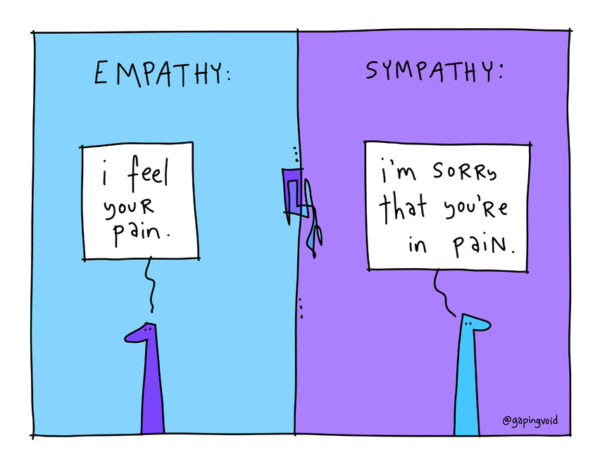
9) Learn empathy for them.
Everyone on your team is different. They come from different backgrounds and experiences. If they're struggling with something outside work, it rarely can avoid impacting their work.
You can give them tough love and they'll resent you, or you can help and show empathy and they'll appreciate you.
It's hard for people to volunteer that they're struggling, but if you meet with them one on one, you have time to focus on them. And if you're doing it right, they're more likely to feel comfortable opening up.
All of this then helps you lead them better, because you know when they may be distracted, need a lighter load, or temporary support/accommodation.
Need to boost your emotional intelligence and empathy?
- Learn all about emotional intelligence in leadership.
- A key part of improving your EQ is raising your self awareness so you understand how you affect others.

10) Get forgiven for your mistakes.
We all make mistakes. When a friend or trusted colleague makes a mistake, we are much more likely to forgive them.
As a manager, you're going to make mistakes and the more trust and rapport you have with your team, the more likely they will understand and forgive you. You build that trust and rapport by having your own empathy for them, which comes from one on ones.
Also, if you talk about mistakes in your one on ones with employees, they'll be more likely to also admit their mistakes as well. Your example carries great weight, and in very few ways are they more important than fixing and admitting mistakes.

11) Make them feel heard.
Every employee has a unique perspective of how the company operates.
Valuing everyone's insights as to what they're seeing not only helps you with getting more signal on important issues, but makes them feel like a valued part of the company.
Especially as a company or department grows, people can feel marginalized and lost. One one ones are an opportunity to make sure you don't miss out on what they have to say.
Are you asking the right questions?
- Learn to be a better listener by learning to practice active listening here.
- Build a habit of asking questions to become a better leader whose employees will then feel heard.

12) Avoid surprise departures.
If someone is thinking about leaving your company, the warning signs will come up in 1 on 1s. If you don't have 1 on 1s, it will be much easier to feel like you're not missing anything.
Most lost employees can be saved if you address what's bothering them, but when will they have a chance to raise them if you don't set aside time 1 on 1 with them? Unfortunately, most people won't come to you with a series of complaints out of the blue.
The only way to avoid surprises is to be proactively listening, learning, and building the relationships with everyone on your team.
Already have surprise departures?
- Learn why employees leave in waves and what to do about it.
- Find out how you may be causing low morale on your team that causes turnover.
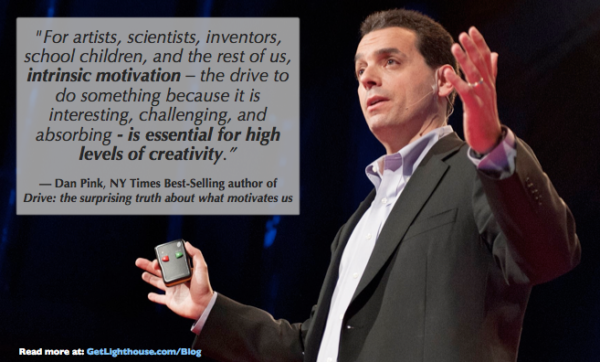
13) Learn what drives your team.
Not everyone is motivated by the same things. Outside of sales teams, money is rarely the largest long term driver for people. The more you get to know your people in 1 on 1s, the more you'll know how to motivate each person uniquely.
This is especially important in creative fields. As Dan Pink's research has found, intrinsic motivation is key to knowledge workers doing their best. And you won't know what those things are unless you take the time to ask.
Want to be a master motivator?
- Learn how to retain employees long term by tapping into their deepest motivations.
- Discover the 10 most important drivers that motivate and de-motivate your team members.
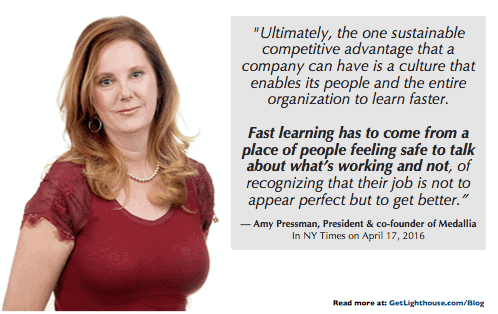
14) Create a safe space for their ideas.
Just like you can float ideas to your people, 1 on 1s can be a great place for your reports to share with you loosely formed ideas they have.
Often a brief discussion in a 1 on 1 can help encourage them to prepare it to present to the team, or understand why it's not a good idea right now. Either way, they need a safe place to spare them making 50 slides on an idea to feel like they can share it.
And if you really want to be a pro, ask them good questions to get them thinking about how to improve your team, company, or their job. They may not realize you want to hear their ideas until you ask.
Want to get more creativity from your team?

15) Give them control of a meeting for once.
If you're in a very hierarchical organization, lower level employees can feel powerless. They can easily feel like their work doesn't matter and no one cares about them. They're just one, tiny cog in a giant machine.
Meanwhile, one on ones can help flip that feeling. It becomes the one time per week that they feel in control. It gives them the freedom to talk about whatever is most important to them without having to try to fight for time on your busy calendar ad hoc.
It can also give you a chance to remind them that their work matters, and that you care about them, as you give them your undivided attention each one on one meeting.
Need help getting the most from one on ones with employees specific to what you talk about?
- Learn why you need a one on one meeting agenda and how to make it great.
- Send your team members this blog post on effective 1 on 1 meetings so they know what to expect.
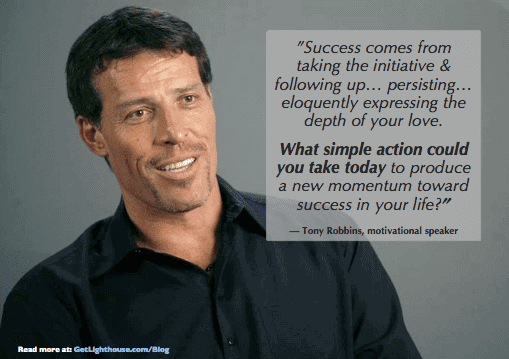
16) Relieve boredom or stagnation on your team.
Many employees, especially in Generation Y, are constantly looking for new ways to grow and learn. If they spend too much time with the same role and responsibilities, they can become bored and feel like they've plateaued.
You can either milk them for their experience until they leave for a new company, or have a regular conversation about it in 1 on 1s and possibly help them get into a new role in your company.
Once again, this comes down to having time to talk about these kinds of things. It's so easy for this and many other topics in this post to slip and never get discussed. Unfortunately, when that happens, you're getting a surprise 2 weeks notice meeting instead.
Need to keep your best employees engaged?
- Learn what Gallup's major employment surveys have revealed about employee engagement and what you should do about it.
- Learn how to navigate generational differences in the workplace here
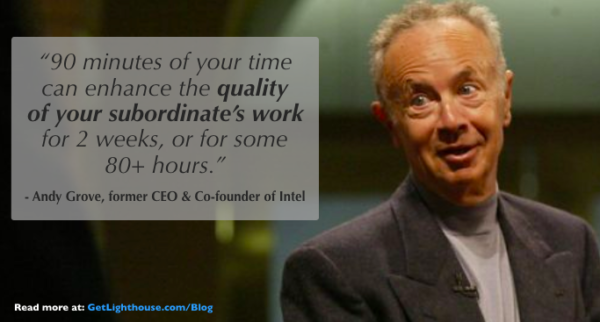
17) Break up your day.
One on ones are a change of pace from other meetings. These meetings aren't about deadlines and decision making; they're about your employee and what's important to them.
That can be a breath of fresh air in a hectic day of meetings, powerpoint decks, and fighting for Inbox Zero. Assuming you like your team members, it can also be an enjoyable time to reconnect with them.
It's huge for your employees, too. They may feel stressed, concerned, or have something burning on their mind. By making time every week or two to have one on ones with employees, you ensure they have a regular pressure relief valve with you.
New to one on ones with employee?

18) Have an excuse to get outside the office.
It's often helpful to get outside the conference room for these meetings, as it helps further establish the context switch from being all about what the company needs to what your report needs. If the weather permits, going for a walk can be refreshing.
Aaron Sorkin, Mark Zuckerberg, and Arianna Huffington are well known for walking meetings, so why not give them a try? Even if you're remote, this can be done by taking your computer or phone outside and encouraging them to do the same.
Are you getting outside and taking enough breaks?
- Learn why managers should take breaks
- Learn how to relieve workplace stress, including tapping into nature's benefits.
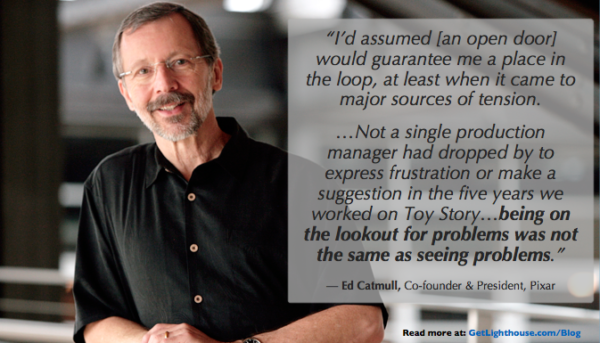
19) Have the conversations you never get around to.
How many times does a thought cross your mind that you should talk to someone about?
Maybe it's something you know you should do in person, so you don't send an email. Then, a week goes by and you realize you never took the time to have that conversation and now the problem has gotten worse.
One on ones with employees are a great time to talk about those topics. Importantly, by having them regularly, these topics will never build up too much, or go unsaid for too long.
Are you missing conversations that need to be had?
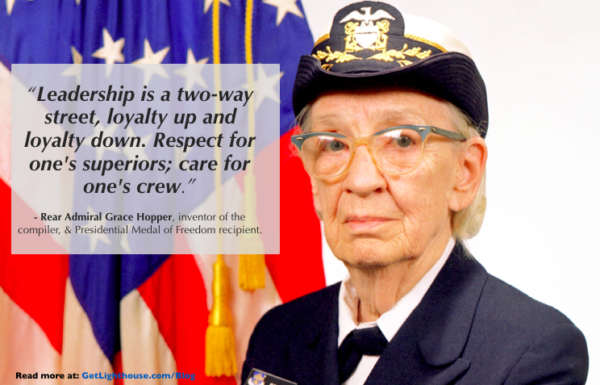
20) Be more consistent with your team.
Are you treating your team equally? Do you fairly divide your attention or does the squeaky wheel get the grease?
No matter how hard you try, there's a good chance you're investing more time in some people than others. By giving everyone a set amount of your time to focus on them in a 1 on 1, you can ensure no one is getting completely lost in the shuffle.
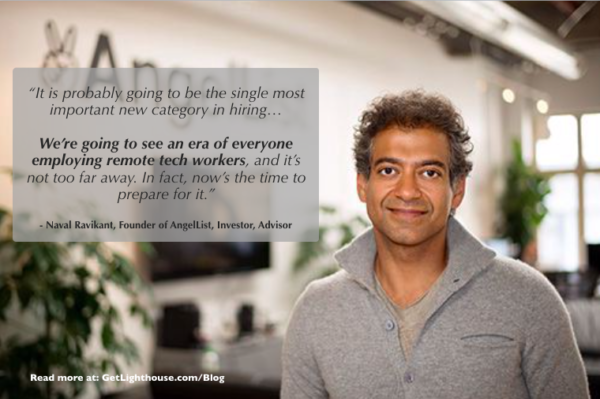
21) Improve your remote management.
When you manage remotely, one on ones with employees become even more important.
There's so many conversations that are easy to have in an office that just never happen remotely. You can't turn to them quick, see them struggling when you look across the office, or easily grab them for a quick discussion by the water cooler.
Also, because working remotely is so new for everyone, there's a lot of iteration we all have to do to get it right.
The best way to improve how your team works together remotely is to have time to talk about the unique challenges it presents. Your one on ones with them are a perfect time to talk about this.
Want to be the best remote manager you can be?
- How to Effectively Manage Remote Employees
- Ask these 31 questions specifically designed for remote employees

22) Better lead through a crisis.
In a crisis, the stakes are higher in every way. You need the best from your team, everyone is more stressed, there's a lot of uncertainty, and there's pressure to find a way through.
Everything you're feeling, your team will feel as well, and likely less well-informed than you as a leader.
That means regular, open communication is *essential*, which is why one on ones with employees are key to navigating a crisis. This gives you the time set aside to get their ideas for turning the corner, as well as to address and hear out their concerns.
This is key both for the success and survival of your company, and to make sure employees don't start jumping ship and leaving.
Need help navigating a crisis?
- Ask these 18 questions to help lead your team in a crisis.
- Learn how to keep your team engaged during a recession here.

23) There's overwhelming data that shows 1 on 1s provide real value.
Much of what a manager may tell you about why they like to have one on ones with employees is qualitative and anecdotal by nature. Fortunately, a number of companies have now run data driven experiments proving the value of 1 on 1s.
A few of those results regarding one on ones:
- From HBR: Employees [who don't have one on ones] are four times as likely to be disengaged as individual contributors as a whole, and are two times as likely to view leadership more unfavorably
- Adobe, "saw a 30 percent reduction in voluntary turnover.”
- GE was able to "drive a fivefold productivity increase in the past 12 months.”
- From Gallup: "On average, only 15% of employees who work for a manager who does not meet with them regularly are engaged; managers who regularly meet with their employees almost tripled that level of engagement."
These are pretty substantial impacts measured at and by very well known, respectable companies. If they see the value, maybe you should give them a try, too.
Still looking for more data?

24) Have a happy, motivated team.
In the end, all of these reasons are just small pieces of what it's really all about: getting the most out of your team and developing your people.
One on ones are a big part of making sure you do all the little things that add up to creating a happy, motivated team. No one does everything we've described every single time they meet with their team. Yet, that's the beauty of one on ones; they're a Swiss army knife to tackle all kinds of problems, create new opportunities, and avoid bigger issues from developing.
Trying to solve the puzzle of motivating your team?
- Learn how you can motivate your team without breaking the bank.
- Check out our praise and positivity guide that can help you be a more motivating leader.

25) Get it right the second time.
Maybe you tried 1 on 1s before and they didn't work for you. Were you consistent in holding them? Did you follow through on issues they brought up? Did you give them a real chance or stop after a week?
You have to follow through on what you hear and give a few months to really build trust to tackle big issues in 1 on 1s. All of this takes time, and then it really pays off.
Trying again on its own is a good reason to have one on ones with employees on your team; in doing so, you show them that persistence pays off and that you're willing to learn from past mistakes.
Not sure where to start, or what to do in the meeting?
Can you really fit all of this in a one on one?!?!?
No, you can't cover all of this in a single one on one. And without one on ones, it's highly doubtful you can ever hope to cover all of those important things. However, over time, you can cover all of these areas in regular one on ones.
There are many competing demands of your attention as a manager, many of which pay off faster than the long term investment in your people. One on ones are a tremendous tool and an essential part of being an effective manager.
Are you and your managers wasting their 1 on 1s?
There is no greater investment to make in your team than having 1 on 1s. Yet, done poorly they’re a huge waste of time.
That’s why we made the 1 on 1 Master Class. You and your fellow managers learn step by step how to supercharge these meetings to motivate your teams, fix problems, coach your people, and much more.
You can learn how Lighthouse Lessons can help your leaders like we helped SeedBox Technologies by signing up here.

